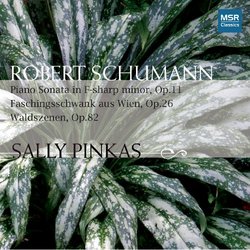| All Artists: Sally Pinkas Title: Robert Schumann: Piano Sonata in F-sharp minor; Waldszenen; Faschingsschwank aus Wien Members Wishing: 0 Total Copies: 0 Label: MSR Classics Original Release Date: 1/1/2009 Re-Release Date: 12/16/2008 Genres: New Age, Classical Styles: Instrumental, Chamber Music, Forms & Genres, Fantasies, Sonatas, Historical Periods, Classical (c.1770-1830) Number of Discs: 1 SwapaCD Credits: 1 UPC: 681585132326 |
Search - Sally Pinkas :: Robert Schumann: Piano Sonata in F-sharp minor; Waldszenen; Faschingsschwank aus Wien
 | Sally Pinkas Robert Schumann: Piano Sonata in F-sharp minor; Waldszenen; Faschingsschwank aus Wien Genres: New Age, Classical
ROBERT SCHUMANNS creative outpourings, both musical and literary, reflect the ardent romantic spirit of 19th century Germany. Schumann left behind a comprehensive oeuvre of instrumental and vocal compositions. In addition,... more » |
Larger Image |
CD Details
Synopsis
Product Description
ROBERT SCHUMANNS creative outpourings, both musical and literary, reflect the ardent romantic spirit of 19th century Germany. Schumann left behind a comprehensive oeuvre of instrumental and vocal compositions. In addition, throughout his short life he remained at the forefront of a heated literary debate, becoming one of the most influential musical commentators of his generation. His greatest contribution as a composer, arguably, was to the repertoire for solo piano (until 1840 he wrote predominantly for the piano). He himself had hoped to become a pianist in his youth, and his marriage to the celebrated pianist Clara Wieck was to keep him intimately involved with the instrument for the rest of his life. Schumann s musical style followed the paths explored by his admired predecessors Beethoven and Schubert. The pianoforte of his time had evolved, however: it had a wider pitch range, as well as the capacity to produce a richer and louder sound than that produced by earlier keyboards. Schumanns ambitious scoring for this larger instrument challenged the pianist to create a dense, almost orchestral sound. Further, the emotionally charged content of Schumanns music required the performer to reach beyond the technical, into the spiritual realm. The rewards were considerable, as both performer and listener were drawn to the exuberant vitality of a passionate nature. Since her London debut at Wigmore Hall, Israeli-born pianist SALLY PINKAS has presented recitals in Italy s Villa Serbelloni (Bellagio) and Villa Aurelia (Rome), Bulgaria s National Gallery (Sofia), in Israel, France and throughout the United States. She has appeared as soloist with the Boston Pops, Aspen Philharmonia, Jupiter Symphony, Tallahassee Symphony and Dobrich Chamber Orchestra (Bulgaria). Summer festival credits include the Rockport, Music Mountain, Marlboro, Tanglewood and Aspen Music Festivals in the United States, as well as Kfar Blum (Israel), Rocca di Mezzo (Italy) and Pontlevoy (France). As a chamber musician, Ms. Pinkas explores a wide repertoire ranging from the traditional to the contemporary. The Hirsch-Pinkas Piano Duo (with husband Evan Hirsch) has performed throughout the US as well as in China, Nigeria, Russia, Israel, Italy, France and Bulgaria, garnering critical acclaim. The Duo has commissioned, premiered and recorded works by George Rochberg, Daniel Pinkham, Thomas Oboe Lee and Peter Child for the Gasparo, Arsis and Albany labels. With her long-time partner, flutist Fenwick Smith, Pinkas has recorded a 3-CD set of the complete flute chamber works of Philippe Gaubert (Naxos). A disc featuring the Fauré Piano Quartets with the Adaskin String Trio was recently released by MSR Classics [MS1293]. Among her other collaborators are the Blair, Biava, Ciompi, and Lydian String Quartets. Pinkas solo recordings include Debussys Twelve Etudes and Estampes (Centaur), and Bread and Roses: Piano works by Christian Wolff (Mode). Her recording of Gabriel Faurés Thirteen Nocturnes (Musica Omnia) was named one of 2002s best CDs by Richard Dyer of the Boston Globe. Brown University awarded her the prestigious Howard Fellowship for a recording of George Rochbergs solo piano works (Gasparo).

 Track Listings (18) - Disc #1
Track Listings (18) - Disc #1